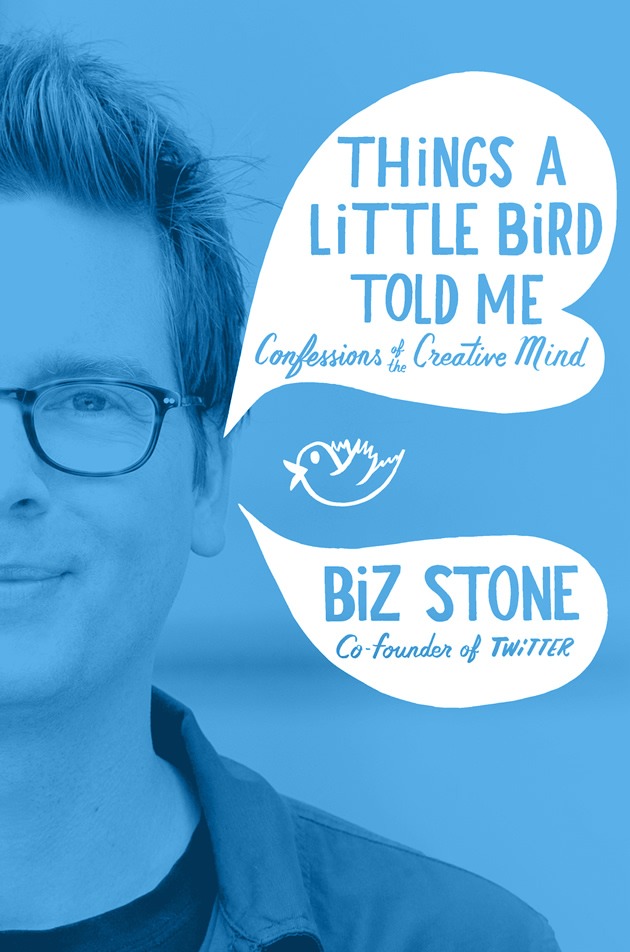
Confessions of the Creative Mind
OK, we’re not going to lie to you: you’ve heard this story once before! “Things a Little Bird Told Me” is the story of Twitter afresh!
The difference in the case of this book is that, unlike “Hatching Twitter,” it’s written by someone who knew the things inside out.
Why?
Well, because he directly participated in them.
Meet Biz Stone, entrepreneur extraordinaire, and hear his side of the story.
Summarized, of course.
Who Should Read “Things a Little Bird Told Me”? And Why?
The first time we had Twitter’s turbulent history on our book-reading menu, we said that it’s a book investors and entrepreneurs should sincerely enjoy. Nothing’s changed in the meantime.
Biz Stone’s account, though, may be an even more interesting read than Nick Bolton’s. True, it lacks the appealing novelistic style, and even most of the juicy details, but here you have a firsthand experience at your disposal.
In a world of fake news and stories, that should be enough in itself. The added bonus is the option to contrast and compare.
About Biz Stone
 Biz Stone is an American entrepreneur, co-founder of Twitter. A book designer by trade, he rose to become a popular angel investor, and a successful businessman. He has backed a wide range of popular companies, from Square and Slack to Medium and Pinterest. His last venture was the search engine Jelly, recently acquired by Pinterest.
Biz Stone is an American entrepreneur, co-founder of Twitter. A book designer by trade, he rose to become a popular angel investor, and a successful businessman. He has backed a wide range of popular companies, from Square and Slack to Medium and Pinterest. His last venture was the search engine Jelly, recently acquired by Pinterest.
Biz Stone is the author of three books. “Blogging” (2002) and “Who Let the Blogs Out?” (2004) are the other two.
“Things a Little Bird Told Me Summary”
Our previous story on Twitter started with Noah Glass meeting Evan Williams in 2002.
The beginning of Biz Stone’s story, however, has nothing to do Twitter. Or even programming, for that matter.
You see, Biz Stone is an unlikely tech magnate. For the simple reason, that he is more of a creative type of person and he is not really knowledgeable when it comes to programming and math. In fact, as he makes clear in “Things a Little Bird Told Me,” Stone’s first job was for a publishing house, Little, Brown and Company.
And it wasn’t a designer’s job, to start with!
Namely, Biz Stone was merely hauling boxes, before sneaking into the designer’s art department to draw a cover for an Allman Brothers Band book. The art director was impressed and Biz Stone was immediately promoted.
Stone predicted the power of the Internet early, so he quit his job as a book designer and started designing websites. In 2003, Google bought his company, Genius Labs, and Biz Stone moved to the Silicon Valley.
And that’s where Evan enters our story.
You see, Biz Stone worked closely with Evan Williams at Google. One day, Stone pitched him the idea of them entering the emerging podcast industry. Evan liked the idea and, the trailblazer that he was, soon took his package and left Google!
Yes, you’ve read that right: Evan left Google to start Odeo!
Biz Stone liked the perks a job at Google brings with it, so he waited a bit. But, then it dawned on him: he wasn’t challenged enough there. And as good as comfort might be, constraints and stress are the real parents of creativity and progress.
So, he left Google as well.
And, at first, it seemed like a very bad decision!
Odeo was still in a stage of development, when Apple announced podcast support. And one thing you don’t want when you’re a cornered start-up is having Steve Jobs in the other corner.
It was then that Jack Dorsey, a brilliant programmer, suggested the idea of a micro-blogging platform. Glass came up with a few names (Jitter, Flitter, Skitter), but the one Stone liked best was Twitter.
And that’s how, on March 21, 2006, Twitter was born.
In its earliest stages, the website had a lot of problems. Crashes happened almost as often as tweets being sent. It required a lot of work and dedication. It also required great communication and management skills.
And Biz Stone had them both.
He based his entire PR campaign on one concept only: honesty. He told users exactly what was happening and why was Twitter failing.
And it worked wonders!
One time, late, late at night, the Twitter’s staff even got some free pizza from some stranger, who had realized both the extent of the crisis and the founders’ sincerity towards its users.
You know the rest of the story from Nick Bolton’s book.
Here’s a quick recap:
Twitter grows and grows, but the problems grow with it. Jack Dorsey is fired by Evan Williams, but, soon, the Board of Directors decides to fire Williams himself. Dick Costolo becomes a CEO, and Dorsey comes back.
In the meantime, Twitter evolves from a geeky little site to a Top 10 website; from a to a place where presidential elections are won, and revolutions are started.
As for Biz Stone?
Well, he’s on to his next project, Jelly.
We’re guessing Twitter isn’t challenging him enough at the moment.
Key Lessons from “Things a Little Bird Told Me”
1. If You Want to Grow – Don’t Get Comfortable
2. Don’t Be Afraid to Embrace Limits
3. Fake It – Until You Make It (aka Create Your Own Opportunities)
2. Don’t Be Afraid to Embrace Limits
3. Fake It – Until You Make It (aka Create Your Own Opportunities)
If You Want to Grow – Don’t Get Comfortable
In a way, Twitter might have never happened if Evan Williams and Biz Stone weren’t brave enough to leave Google.
Interestingly enough, the reason that originally made them do this – Odeo – was a company which failed. Most of us would go mad if in such a situation.
Evan and Biz remained calm and waited for another opportunity. Or, better yet, thought how to create one!
Because, discomfort channels our creative potential; comfort makes us forget about it completely.
Don’t Be Afraid to Embrace Limits
You might think that you have a good idea; just don’t have the resources to make it happen.
Think again!
You have the resources! You just need to modify the idea and it will succeed, nevertheless – of course, if it’s good enough to start with.
For example, Steven Spielberg wanted a fake shark in Jaws, but due to the lack of money, had to find another solution.
And he thought of an even better one: he filmed from the shark’s viewpoint!
Fake It – Until You Make It (aka Create Your Own Opportunities)
You already know that Salvador Dalí was a genius. But, you know what he was before that: a man pretending to be a genius.
Biz Stone employed the same strategy. After all, behind the curtain of his blog, nobody could know who he really was. Saying that he’s a genius gave him both confidence and a vision for the future.
Speaking of which – your future won’t come to you. You’ve got to make it on your own. And, if that means, manufacturing an opportunity – do it!
“Things a Little Bird Told Me” Quotes
I’m not a genius, but I’ve always had faith in myself and, more important, in humanity.If Twitter was to be a triumph, it wasn’t going to be a triumph of technology – it would be a triumph of humanity.Success isn’t guaranteed, but failure is certain if you aren’t truly emotionally invested in your work.invite you to open your mind to new possibilities. Let’s fake it till we make it.Nobody is flawless, and when you act as if you are, it always rings false.Our Critical Review
Biz Stone has been dubbed both one of the 100 most influential people on the planet and the nerd of the year 2014.
If these two aren’t reasons enough to read “Things a Little Bird Told Me,” here are few more: the book is an attention-grabbing rags to riches American story, it has a few straightforwardly applicable leadership lessons, and it is written in an easy-to-read style.
And, oh yeah – it’s about the creation of Twitter, one of the most important companies of our age!

0 comments:
Post a Comment
Note: only a member of this blog may post a comment.